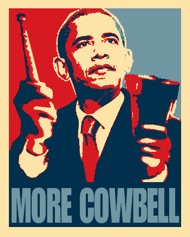 You’ve probably never heard of Gershon Legman.
You’ve probably never heard of Gershon Legman.
He was the cultural critic who claimed to be the inventor of the famous phrase, “Make love, not war,” at a lecture given at Ohio University in the early sixties.
And you’ve probably never heard of Penelope Rosemont, either.
She was the radical activist who popularized Gershon’s phrase. Two years after his lecture, she printed thousands of buttons at the Solidarity Bookshop in Chicago, Illinois, and then distributed them at the Mother’s Day Peace March.
THE POINT IS: I’m insanely jealous.
I should have grown up in the sixties, not the eighties.
But since I didn’t have much choice in the matter, I’ve decided to reclaim my hippie roots and create a few radical slogans of my own. Straight from my monthly column at American Express Open Forum, here we go:1. Break rules, not hearts. When you break a rule for somebody, you create an act of flexibility in a moment of need. You demonstrate that at your company, every customer is the exception. And you prove that you’re willing to lose something on the first interaction to guarantee a lifetime of loyalty.
That’s what happened to me at a recent hotel in New York. Although I botched my reservation online, they still found a room for me. Even though their policy indicates otherwise. When was the last time you went off script?
2. Conduct symphonies, not transactions. Once on a weekend vacation, we stumbled into a charming art gallery. My girlfriend ended up buying this fabulous beaded necklace at a great price. Later, while she was in the bathroom, the owner secretly asked me for her address so she could send Brittany a personalized, hand written thank you note.
So I gave it to her. And by the time we returned home, the card had already arrived. That’s not service – that’s music. That’s not a piece of jewelry – that’s a story worth repeating. Do your customers evangelize when you’re gone?
3. Deliver inspiration, not packages. During my cousin’s wedding ceremony, there was a traditional blessing over the wine. But he and his bride also performed a new ritual: Spilling a drop of wine. According to Collin, this act recognizes those couples that are not given equal rights. Couples who aren’t as fortunate as he and Robin.
As such, it wasn’t just a drop of wine – it was a drop of hope. And those of us lucky to witness that would never think about marital equality the same way again. That’s when it occurred to me: Sometimes you have to make a mess to make a statement. I wonder whom you might inspire by getting your hands dirty. What if you did that on camera?
4. Earn respect, not money. Last month I designed a Brandtag Identity Collage for my client, Closeouts With Class. When I asked their chairman to share his thoughts on respect, here’s what he said:
“Respect buys loyalty. It makes your employees stay, makes your customers buy, makes your suppliers sell and makes your competitors drool.”
Respect is your baseline. And if you treat it as your intentional commitment, the incidental result (money) will eventually come. Are you helping people feel more respected every time they deal with you?
5. Give gifts, not burdens. If it doesn’t change the recipient, it’s not a gift. If you oblige people to reciprocate, it’s not a gift. And if you make people work hard to get it, it’s not a gift. What you give has to alter people. It has to fill their heart, not clutter their desk. Otherwise all you’ve done is add to the slush pile.
Meanwhile, they end up with an office full of useless nouns. When it would have been smarter to give the gift of social elevation, perhaps by giving them a front row seat to their own brilliance. That’s what my friend Derek does. When any of his employees win – in any way – he goes out of his way to blog about it. What gift are you famous for giving?
6. Inject soul, not machinery. Customers need you to bring humanity to the moment. They need you show up, even when it’s hard. Sadly, this is where smart companies blow it: They try to meet budget by outsourcing the human function. Instead of talking to human operators, customers get robots.
Instead of interacting with desk agents, customers get kiosks. And instead of getting an actual email from real person, customers get autoresponders. Meanwhile, all their customers want is to be treated like people – by people. Where are you sacrificing experiences for expenses?
7. Keep commitments, not secrets. I give more than fifty presentations around the globe each year. And while I speak on a variety of topics to a wide range of industries, I never fail to spend the final few minutes of each talk on the topic commitment. Specifically, the use of a commitment device. That’s a term I coined for something visual, tangible and palpable that reminds people that you’re not going away.
Personally, I use a nametag. And not just the sticker – the tattoo of that sticker on my body. Can’t get more committed than that. I wonder what object you will employ to show people you’re not going away. After all: When you commit with both feet, people don’t just pay attention – they pay dividends. What single act have you done every day for the past ten years?
8. Leave artifacts, not brochures. An artifact is worth saving and sharing. It’s a unique way to extend the influence of your work. And it’s the souvenir you leave with people that has the potential to change and inspire them.
At my favorite coffee spot, The Mud House, the owner makes latte art. When your cup of java is prepared, Casey carefully crafts a portrait, landscape or flower into the foam of your drink. It’s a combination of foam, chocolate and cinnamon. And she even does custom orders, should there be a particular image you’d prefer.
That’s an artifact: Done by hand, done with love. And your challenge is to figure out how to stop wasting paper and start leaving something behind that matters. Does your fancy brochure actually influence customer decisions?
9. Send love letters, not pitches. Love isn’t a weakness – love is the bell that’s always ringing. The question is: Is your brand brave enough to hear it? Simplifilm certainly is. They’re a video production firm run by my friend Chris Johnson. When he finds a dream client, he doesn’t assault them with an endless stream of marketing materials and sales literature.
Instead, he sends them an email that reads: “We love you guys a ton. We wrote you a love letter. I know it’s tacky, but we can’t help ourselves. And although we have more than plenty of business, we want you. We believe what you do is vitally important.” Once a prospect reads the love letter, it’s pretty damn hard to resist.
The point is: Your brand is measured by how you love. Lead with your heart. Will you tell customers you love them before somebody else does?
10. Write books, not emails. Many of the people in my mentoring program are fellow writers. And the most common complaint is, “I don’t have enough time to finish my book.” Interestingly, those same people have no problem spending two hours a day clearing their inbox. They have no time sitting around waiting for something meaningless to react to.
If only they knew that emailing was nothing but a digital fidget. If only they knew that emailing, while a nice way to preserve the illusion of productivity, rarely changes the world. Are you artfully creating constant distraction to prevent yourself from executing?
11. Build bridges, not barriers. If it were just you, it would be hard to survive. If it were just you, there would be nobody to lean against. And if it were just you, there would be nobody to keep you on your toes. If you want to build a bridge to your competitors, treat them like partners.
Take a hint from Progressive Insurance. Almost twenty years ago, they became the first auto insurance company to provide its rates alongside the rates of other companies. That way, consumers could easily compare and decide – even if they didn’t use Progressive. And today, they still lead the industry. Because they’re willing to share in almost every direction. How could you convert your competitors into a power source?
REMEMBER: There’s nothing wrong with being radical.
All that means is that you’re true to your roots.
And maybe willing to make a few buttons.
ET ME ASK YA THIS…
What’s your radical slogan?
LET ME SUGGEST THIS…
For the list called, “52 Random Insights to Grow Your Business,” send an email to me, and you win the list for free!
* * * *
Scott Ginsberg
That Guy with the Nametag
Author, Speaker, Publisher, Artist, Mentor
[email protected]
 Never the same speech twice.
Never the same speech twice.
Now booking for 2011-2012!
Watch The Nametag Guy in action here!
 People don’t want to learn.
People don’t want to learn.

 You’ve chosen an uncertain path.
You’ve chosen an uncertain path. “Love is never having to say you’re sorry.”
“Love is never having to say you’re sorry.” Caring is not an emotion – it’s an intersection.
Caring is not an emotion – it’s an intersection.  Any time you attend a meeting, make a sales call, give a presentation, write a blog or interview with a prospective employer, you have a choice:
Any time you attend a meeting, make a sales call, give a presentation, write a blog or interview with a prospective employer, you have a choice: When it comes to design, less is more.
When it comes to design, less is more. Any time you attend a meeting, make a sales call, give a presentation, write a blog or interview with a prospective employer, you have a choice:
Any time you attend a meeting, make a sales call, give a presentation, write a blog or interview with a prospective employer, you have a choice: Enough is enough.
Enough is enough. You’ve chosen an uncertain path.
You’ve chosen an uncertain path. You’ve probably never heard of Gershon Legman.
You’ve probably never heard of Gershon Legman.